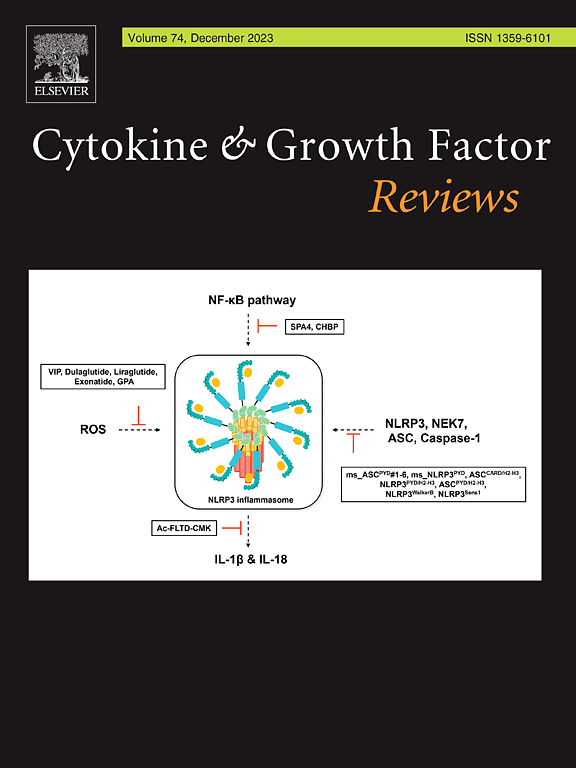The role of transforming growth factor β in cervical carcinogenesis
IF 9.3
2区 医学
Q1 BIOCHEMISTRY & MOLECULAR BIOLOGY
引用次数: 0
Abstract
Human papillomavirus (HPV) is involved in virtually all cases of cervical cancer. However, HPV alone is not sufficient to cause malignant development. The effects of chronic inflammation and the interaction of immune components with the microenvironment infected with the high-risk HPV type (HR) may contribute to cancer development. Transforming growth factor β (TGFB) appears to play an important role in cervical carcinogenesis. Protein and mRNA levels of this cytokine gradually increase as normal tissue develops into malignant tissue and are closely related to the severity of HPV infection. At the onset of infection, TGFB can inhibit the proliferation of infected cells and viral amplification by inhibiting cell growth and downregulating the transcriptional activity of the long control region (LCR) of HPV, thereby reducing the expression of early genes. When infected cells progress to a malignant phenotype, the response to the cell growth inhibitory effect of TGFB1 is lost and the suppression of E6 and E7 expression decreases. Subsequently, TGFB1 expression is upregulated by high levels of E6 and E7 oncoproteins, leading to an increase in TGFB1 in the tumor microenvironment, where this molecule promotes epithelial-to-mesenchymal transition (EMT), cell motility, angiogenesis, and immunosuppression. This interaction between HPV oncoproteins and TGFB1 is an important mechanism promoting the development and progression of cervical cancer.
转化生长因子β在宫颈癌变中的作用。
几乎所有宫颈癌病例都与人类乳头瘤病毒(HPV)有关。然而,仅靠 HPV 并不足以导致恶性发展。慢性炎症的影响以及免疫成分与感染高危型 HPV(HR)的微环境的相互作用可能会导致癌症的发生。转化生长因子β(TGFB)似乎在宫颈癌的发生中起着重要作用。当正常组织发展为恶性组织时,这种细胞因子的蛋白和 mRNA 水平会逐渐升高,并且与 HPV 感染的严重程度密切相关。在感染初期,TGFB 可通过抑制细胞生长和下调 HPV 长控制区(LCR)的转录活性,从而降低早期基因的表达,抑制感染细胞的增殖和病毒的扩增。当受感染的细胞发展到恶性表型时,TGFB1 对细胞生长抑制作用的反应就会消失,对 E6 和 E7 表达的抑制作用也会减弱。随后,高水平的 E6 和 E7 肿瘤蛋白会上调 TGFB1 的表达,导致肿瘤微环境中的 TGFB1 增加,而这种分子会促进上皮细胞向间质转化(EMT)、细胞运动、血管生成和免疫抑制。HPV 癌蛋白与 TGFB1 之间的这种相互作用是促进宫颈癌发生和发展的重要机制。
本文章由计算机程序翻译,如有差异,请以英文原文为准。
求助全文
约1分钟内获得全文
求助全文
来源期刊

Cytokine & Growth Factor Reviews
生物-生化与分子生物学
CiteScore
21.10
自引率
1.50%
发文量
61
审稿时长
22 days
期刊介绍:
Cytokine & Growth Factor Reviews is a leading publication that focuses on the dynamic fields of growth factor and cytokine research. Our journal offers a platform for authors to disseminate thought-provoking articles such as critical reviews, state-of-the-art reviews, letters to the editor, and meeting reviews.
We aim to cover important breakthroughs in these rapidly evolving areas, providing valuable insights into the multidisciplinary significance of cytokines and growth factors. Our journal spans various domains including signal transduction, cell growth and differentiation, embryonic development, immunology, tumorigenesis, and clinical medicine.
By publishing cutting-edge research and analysis, we aim to influence the way researchers and experts perceive and understand growth factors and cytokines. We encourage novel expressions of ideas and innovative approaches to organizing content, fostering a stimulating environment for knowledge exchange and scientific advancement.
 求助内容:
求助内容: 应助结果提醒方式:
应助结果提醒方式:


